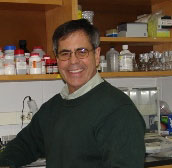Professor of Biology
by Sandy Gholston - January 3, 2011
 Leonardo da Vinci once said, "Learning never exhausts the mind."
Leonardo da Vinci once said, "Learning never exhausts the mind."
For more than three decades, learning, teaching and research have been passions for James Hoerter, a professor of Biology at Ferris State University.
In the last year, Hoerter's passion has been strengthened. A Fulbright Fellowship trip to Ireland sparked a zebrafish fascination that led to a three-year grant from the National Institute of Health to explore the cause of melanoma for Hoerter. The Ireland visit strengthened his interest in this deadly form of human skin cancer. Melanoma is "a form of cancer that begins in melanocytes (cells that make the pigment melanin). It may begin in a mole (skin melanoma), but can also begin in other pigmented tissues, such as in the eye or in the intestines," according to the National Cancer Institute. NCI further states that an estimated 68,130 new cases were discovered in 2010 along with 8,700 deaths.
Melanoma statistics are all too real and all too deadly. That reality, in part, encouraged Hoerter's passion to learn more about the cause of melanoma.
"While in Ireland on a Fulbright Fellowship, I became fascinated with using zebrafish to study the role of stem cells in the development of melanoma," Hoerter said as he discussed his three-year grant from the National Institute of Health. "The genes controlling stem cells in the skin are almost identical to humans. I knew this was the perfect way to determine how adult stem cells are damaged by the harmful rays of the sun. When I got back to Ferris, I immediately started to lay the groundwork for this project; I knew that it was one of the best research ideas I'd had in years."
Hoerter, whose research began in 2009 on the strength of a Ferris Foundation for Excellence Merit Grant which he used to purchase a zebrafish habitat, believes education and research can be – and should be – integrated. Part of his mission is to break down barriers – both perceived and real – between education and research. In many ways, that concept fits in with Ferris' mission of a hands-on educational experience that applies the theory-meets-practice model.
"I want to dispel the common notion that education and research are separate activities, and that research can only occur at a graduate university," Hoerter said. "I believe research and education go hand in hand. The classroom is not the only place where learning happens, in fact, it is taking place much more outside of the classroom than inside the classroom these days.
"The National Institutes of Health which is providing funds for this research recognizes how important it is to have undergraduates take an important role in this research," he added. "More often than not, this affects their career decisions in a very positive way."
One look at Hoerter's teaching philosophy illustrates his dedication to research.
Here is a portion of his philosophy on research:
I believe research is really the process of connecting the "data dots" of different disciplines so that the total picture or reality of the way things actually work becomes visible. It takes a lot of hard work to recognize which dots to connect before a pattern begins to emerge. We are never really going to do anything other than create a dot or two in our own research labs unless we take time to step back and try to recognize how our dots connect to others, forming the "big beautiful tapestry of life."
I view the research process as a marathon, not as a sprint.
The willingness to go the extra mile, to strengthen his own knowledge base, shows learning is a continuing process - even for a faculty member as accomplished as James Hoerter.

